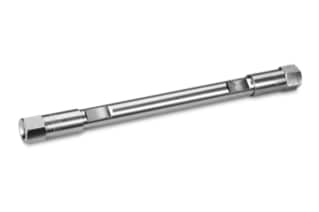
|
Chemistry |
C18 |
|
Separation Mode |
Reversed Phase |
|
Particle Substrate |
Silica |
|
pH Range Min |
2 pH |
|
pH Range Max |
8 pH |
|
Maximum Pressure |
6000 psi (415 Bar) |
|
Endcapped |
Yes |
|
Bonding Technology |
T3 |
|
Silanol Activity |
Medium |
|
Particle Shape |
Spherical |
|
Particle Size |
5 µm |
|
Endfitting Type |
Waters |
|
Pore Size |
100 Å |
|
Format |
Column |
|
Surface Area |
330 |
|
System |
HPLC |
|
USP Classification |
L1 |
|
Inner Diameter |
4.6 mm |
|
Length |
100 mm |
|
Carbon Load |
14 % |
|
UNSPSC |
41115709 |
|
Brand |
Atlantis |
|
Product Type |
Columns |
|
Units per Package |
1 pk |

Atlantis T3 Column, 100Å, 5 µm, 4.6 mm X 100 mm, 1/pk
Atlantis T3 Columns set the industry standard for retaining and separating polar analytes with an HPLC system. These columns are universal, silica-based, reversed-phase C18 columns that provide balanced retention of polar and hydrophobic molecules and should be your first choice when developing separations of polar and non-polar compounds. The high quality Silica packing enables separations across a wide pH range of 2-8. Atlantis designs these columns to have an incredibly long usable lifetime which saves you the staggering cost of frequently replacing your lab equipment.
The Atlantis T3 column is fully functional for use with Aqueous mobile phases and are fully Mass Spectrometry compatible. Waters' advanced T3 bonding process utilizes a trifunctional C18 alkyl phase bonded at a ligand density that promotes polar compound retention and aqueous mobile phase compatibility. The proprietary endcapping process is much more effective than traditional trimethyl silane endcapping. This unique combination of bonding and endcapping provides excellent polar compound retention, enhanced column performance, maximized lifetime, superior peak shape, and reliable stability.
Atlantis T3 columns are uniquely designed to offer long predictable column lifetimes under low pH conditions while also providing superior peak shape and polar compound retention. The creation of highly retentive reversed phase C18 columns involves bonding at a ligand density that is less hydrophobic and more compatible with weak and highly aqueous mobile phases.
This superior low pH stability allows for this column to have extremely low percentages of lost retention for analytes such as Methyl Paraben. It is also common for C18 columns to struggle with poor peak shape and shortened column lifetimes for amine-containing bases at pH 7. This is caused by secondary interactions with unreacted silanols that remain present after bonding and endcapping. T3 endcapping technology reacts more with these silanols and dramatically improves peak shape. The silica particle substrate is also at risk of dissolution by high pH mobile phases. T3 bonding technology helps to protect the silica particle substrate and lengthen column lifetimes.
LC columns are constantly at risk of being harmed by dangerous particulate contamination in the mobile phase stream. This chemical contamination can cause harm to column’s packing and dramatically shorten their lifetimes. If you want to protect your Atlantis T3 columns from being damaged you may want to consider purchasing our Atlantis Silica T3 VanGuard Cartridge, 100Å, 5 µm, 3.9 mm X 5 mm, 3/pk. Atlantis T3 VanGuard Cartridges are used to extend analytical column lifetime and performance by removing particulate contamination from the mobile phase stream. This cartridge is optimized to protect all 3.9 mm and 4.6 mm I.D. Atlantis T3 analytical columns containing 5 µm sorbent particles. This investment will help to save you the immense resources which can be used replacing your LC columns prematurely.
How does back pressure affect my column?
Accumulation of particles from solvents, samples, or pump seals may cause the column back pressure to increase over time. This may lead to a system shutdown or leaking column connections. Accumulation of contaminants from dirty samples at the column inlet may lead to a loss of resolution or ion suppression in a mass spectrometer, resulting in erroneous results.